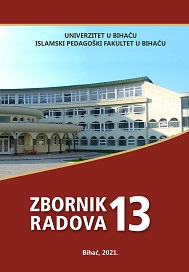ULOGA MEDIJATORA U SPREČAVANJU RAZVODA BRAKA – KOMPARATIVNI PRISTUP U ŠERIJATSKOM I PORODIČNOM PRAVU FBIH
THE ROLE OF MEDIATORS IN PREVENTING DIVORCE - A COMPARATIVE APPROACH IN SHARIA AND FAMILY LAW
Author(s): Elma HušićSubject(s): Islam studies, Family and social welfare, Sharia Law
Published by: ISLAMSKI PEDAGOŠKI FAKULTET U BIHAĆU
Keywords: secular law; Sharia; mediation; legal pluralism;
Summary/Abstract: The family is the most important, elemental value space for one, and this work in its entirety is dedicated to the preservation of identity, sovereignty, values which family propagates and which, as such, determine the whole society. Every family faces with conflict situations through its development, and in this paper we initially pay attention to the causes of conflict, how to resolve it, and transgenerational transmission of negative patterns of behavior that result in triangulation, or involvement of a third person in conflict, which is most common in families. One of the best ways of out-of-court, alternative conflict resolution, ie disputes, is mediation, where the work is full of plentiful talk about its universal values, characteristics of family mediation, its goals, motives, contributions for individuals, its impact on preserving marital union, but also on community of the whole society. The main elaboration is based on the crucial problem of the topic we are dealing with - (un) completed laws and bylaws that dictate the process of applying mediation. Immediately defined legal norms are conditioning incomplete, but also unprofessional application of mediation, which makes the role of mediator become partial or superficial. Legal pluralism, secession or integration of secular and religious law, the need of Muslims for Sharia family law or aversion to it are just some of the segments that we deal with in the concluding part of the paper. This is followed by the speech of Qur'anicHadith texts which indicate the practical basis of the mediation process since the emergence of Islam. We emphasize the tendency of Muslims of Bosnia and Herzegovina to establish institutional dispute resolution through mediation and arbitration, and sharia divorce under the support of the Islamic Community, where the author, as the conclusion of this comparative analysis, expresses his innovative approach in the form of recommendations for establishing a Muslim Arbitration Council under the auspices of the Islamic Community in Bosnia and Herzegovina, and also recommendations for existing laws and bylaws modification on the mediation procedure.
Journal: ZBORNIK ISLAMSKOG PEDAGOŠKOG FAKULTETA U BIHAĆU
- Issue Year: 2021
- Issue No: 13
- Page Range: 283-313
- Page Count: 31
- Language: Bosnian

